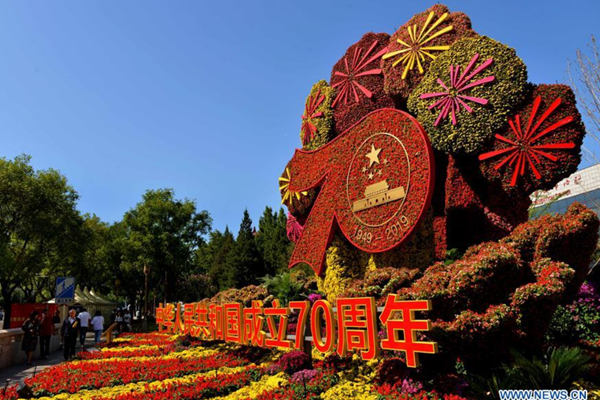China's National Day is coming, and for the Chinese people, its government, and the Communist Party of China, it will be a celebration of China's achievements over the seven decades since the founding of the People's Republic of China on October 1, 1949. It is a good time to reflect on the strengths of the Chinese system and to decode the secrets of its success.

Photo taken on Sept. 23, 2019 shows a flowerbed titled "70th Anniversary of the Founding of the People's Republic of China" in Beijing, capital of China. (Photo: Xinhua)
Perhaps the best way to start is with a discussion on the concept of a political party. In English, the word "party" has the word "part" in it. This division into parts is how we define the concept of a political party in the West. In Western political science, a political party represents the interests of a group, the interests of some people, and partial interests. In other words, there is a never-ending power struggle between groups and institutions.
Like the rest of the world, there exist various political interests in China. The problem is how to balance those interests. In China's view, the best way to do that is to have an overarching authority that can bring the competing interests into focus and keep the nation on track.
In China, the CPC represents the fundamental interests of all people. This makes the political party system different from the Western system, so we cannot simply apply Western political party theories to China. Otherwise, we risk being stuck in the trap of seeing China through the lens of Western theories, rather than from the perspective of China.
The influence of Western discourse has a tendency to drown out Chinese voices and in some cases undermine Chinese discourse on the world stage. There is a lot bias toward concepts of more centralized organization, and in some cases, people simply refuse to understand the Communist Party and the role it plays in the development of China.
If you look at the Party Constitution, it says that the CPC is the vanguard of the Chinese working class and the vanguard of the Chinese people and the Chinese nation. There is meaning behind the words: it means the ruling party in China is the “party of the whole people.”
In the American political system, the two main political parties constantly battle it out for the interests of their group, and various other groups constantly battle it out for greater influence on the national stage. It is a system of division and conflict and it is difficult to bring balance to the competing interests. This type of system has its advantages, but putting the interests of the whole people first is not one of them.
China is a complex country with a long history. The political party system that has formed in China over the years aims to promote unity by bringing together the different interests under one roof. Xi Jinping, the top leader of China, has said that the goal of the Party is to satisfy the Chinese people's yearning for a good life. Its mission is to seek happiness for the Chinese people and to rejuvenate the Chinese nation.
Because the Party represents the fundamental interests of the entire Chinese people, its operational logic, mission, objectives, and organizational structure are different from that of political parties in the West. If we liken a country to a computer, then a party is the operating system, and the OS that powers China is relatively stable and is constantly upgrading itself.
This design has made it possible for China to set and carry out ambitious goals over a long period. For example, the Two Centenaries (two 100-year goals), which aim to build a moderately prosperous society in all respects by 2021 and a modern socialist country that is prosperous, strong, democratic, culturally advanced, and harmonious by 2049, and the goal to alleviate extreme poverty in a country with some 1.4 billion people by 2020.
In the West, it is unlikely that such ambitious goals could be set, let alone carried out. US President Donald Trump’s failed infrastructure plan to upgrade the nation is one example of how difficult it can be to get everyone on the same page. The Western OS is unstable and prone to crashes, and it seems unable to adapt or upgrade in response to changes. Political parties rise or fall with each election cycle, but the cycle just continues all over again and nothing really moves forward due to fierce resistance from different interest groups.
Different operating systems produce different results. In the political realm, China values stability over instability and cooperation over division, and this has allowed China to march forward at an incredible pace. The Western OS, on the other hand, is unstable by design; it lacks an overarching authority to keep the parts in check and to keep the country moving forward in a coherent direction. If there is a flaw in the Western design, it is that the parts are free to damage one other for their own selfish interests and the political party system is unable to end this toxic cycle.


